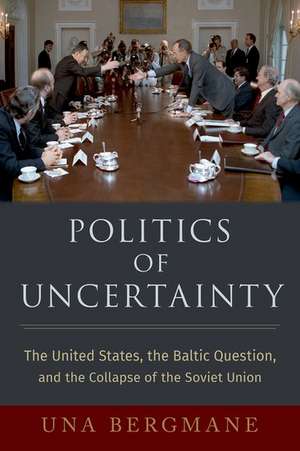Politics of Uncertainty: The United States, the Baltic Question, and the Collapse of the Soviet Union: OXFORD STUDIES IN INTL HISTORY SERIES
Autor Una Bergmaneen Limba Engleză Hardback – 27 apr 2023
Preț: 231.65 lei
Preț vechi: 286.14 lei
-19% Nou
Puncte Express: 347
Preț estimativ în valută:
44.35€ • 45.61$ • 36.79£
44.35€ • 45.61$ • 36.79£
Carte disponibilă
Livrare economică 18-24 ianuarie
Livrare express 15-21 ianuarie pentru 89.60 lei
Preluare comenzi: 021 569.72.76
Specificații
ISBN-13: 9780197578346
ISBN-10: 0197578349
Pagini: 256
Dimensiuni: 162 x 238 x 25 mm
Greutate: 0.52 kg
Editura: Oxford University Press
Colecția OUP USA
Seria OXFORD STUDIES IN INTL HISTORY SERIES
Locul publicării:New York, United States
ISBN-10: 0197578349
Pagini: 256
Dimensiuni: 162 x 238 x 25 mm
Greutate: 0.52 kg
Editura: Oxford University Press
Colecția OUP USA
Seria OXFORD STUDIES IN INTL HISTORY SERIES
Locul publicării:New York, United States
Recenzii
The Soviet Union's sudden and surprising collapse continues to resonate, nowhere more so than in the Baltics. Long subjugated, sometimes pawns, and oftentimes a thorn in the side of Kremlin leaders, the region's recent past tells us much about life next to a superpower. No scholar has better brought the Baltics and the end of the Cold War into focus than Una Bergmane, whose Politics of Uncertainty is certain to set the standard for any future study of this critical geopolitical hotspot.
An excellent work of scholarship, thoroughly researched, original, and incisive. Based on a vast array of sources from the USA, USSR, and Europe, Bergmane gives us a whole new perspective on the Balts' independence struggle and their crucial role in Soviet collapse and the Cold War endgame. This book is essential reading for anyone wanting to understand the strategic significance of the Baltic region today.
Bergmane is a brilliant chronicler of the Baltic quest for independence from Moscow's rule. Juxtaposing Baltic, Russian, and American sources, she tells a very nuanced and yet highly readable story of how Estonia, Latvia, and Lithuania negotiated their exit from the USSR, helping to undermine the Soviet empire in the process. A required read for any student of the Soviet collapse.
While the passing of Mikhail Gorbachev was met with appreciative recollections of his legacy of peace and democratization, Russia's brutal war against Ukraine reminds us that the causes and consequences of Soviet disintegration have not been fully established. As the world re-focuses on the process of Russia's imperial decline, Una Bergmane's analysis of the Baltic role in Soviet collapse is revelatory. With its rare and balanced analysis of the internal and international forces in play at the end of the Cold War, Politics of Uncertainty is essential reading for the post-post-Cold War world.
Bergmane superbly navigates the intricacies of the triangular relationshipbetween Washington, Moscow and the Baltic republics, although for readersunfamiliar with the Baltic context a chronology of events would have beenhelpful. This excellent book is highly recommended for anyone seeking greater insight into the end of the Cold War and the demise of the USSR.
Una Bergmane's book is a significant contribution to the understanding of not only the collapse of the USSR and the independence of the Baltic countries, but also of the origins and evolution of current international politics in the region. I recommend it both to the scholars interested in the region and a wider readership.
An excellent work of scholarship, thoroughly researched, original, and incisive. Based on a vast array of sources from the USA, USSR, and Europe, Bergmane gives us a whole new perspective on the Balts' independence struggle and their crucial role in Soviet collapse and the Cold War endgame. This book is essential reading for anyone wanting to understand the strategic significance of the Baltic region today.
Bergmane is a brilliant chronicler of the Baltic quest for independence from Moscow's rule. Juxtaposing Baltic, Russian, and American sources, she tells a very nuanced and yet highly readable story of how Estonia, Latvia, and Lithuania negotiated their exit from the USSR, helping to undermine the Soviet empire in the process. A required read for any student of the Soviet collapse.
While the passing of Mikhail Gorbachev was met with appreciative recollections of his legacy of peace and democratization, Russia's brutal war against Ukraine reminds us that the causes and consequences of Soviet disintegration have not been fully established. As the world re-focuses on the process of Russia's imperial decline, Una Bergmane's analysis of the Baltic role in Soviet collapse is revelatory. With its rare and balanced analysis of the internal and international forces in play at the end of the Cold War, Politics of Uncertainty is essential reading for the post-post-Cold War world.
Bergmane superbly navigates the intricacies of the triangular relationshipbetween Washington, Moscow and the Baltic republics, although for readersunfamiliar with the Baltic context a chronology of events would have beenhelpful. This excellent book is highly recommended for anyone seeking greater insight into the end of the Cold War and the demise of the USSR.
Una Bergmane's book is a significant contribution to the understanding of not only the collapse of the USSR and the independence of the Baltic countries, but also of the origins and evolution of current international politics in the region. I recommend it both to the scholars interested in the region and a wider readership.
Notă biografică
Una Bergmane, a native of Latvia, is Academy of Finland Research Fellow at the Aleksanteri Institute at Helsinki University and a Baltic Sea Fellow at the Foreign Policy Research Institute in the United States.

